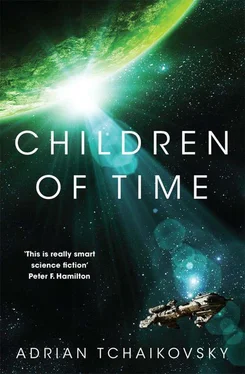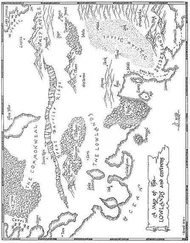But while they were waiting, the destructive and wasteful majority fought with the others, the right-thinkers, and started a great war. She knows now that her audience will understand ‘war’ and ‘catalyst’, and the bulk of the concepts she is using. And they died. They all died. All the people of Earth save just a few. And so they never did come to see what grew on their new-made worlds.
And she does not say it, but she thinks: And that is you. My children, it is you. You are not what we wanted, not what we planned for, but you are my experiment, and you are a success. And that jagged-edged part moves once again and she knows that some part of her, some locked-away fleshy part, is trying to weep. But not from sorrow; rather from pride, only from pride.
In her tiny, insulated world, Portia listens to what God has to say, and tries to assimilate it – as other spider minds across the world must also be trying to grasp what is being said. Some of it is incomprehensible – just as so much of the Messenger’s message is – but this is clearer than most: God is really trying to be understood, this time.
She asks the next question almost simultaneously with Bianca:
So you are our creator? With all the baggage that comes with it: made why? For what purpose?
And the Messenger responds: You are made of My will, and you are made of the technology of that other world, but all of this has been to speed you on a path you might have taken without me, given time and opportunity. You are Mine, but you also belong to the universe, and your purpose is whatever you choose. Your purpose is to survive and grow and prosper and to seek to understand, just as my people should have taken these things as their purpose, had they not fallen into foolishness, and perished.
And Portia, for all that she was never a temple-goer, feels that she – as she ascends into the sparse reaches of the upper air – is fulfilling that very mandate in pushing the frontiers of understanding.
Their ascent has been rapid; God has been long-winded.
They are slowing now, and the colour of the altimeter suggests that even the tenacious Star Nest, which is merely a thin skin around a great mass of hydrogen from which dangles a very little weight, is reaching its ceiling, out where the atmosphere is almost nothing, and therefore there is nothing for the light gas to be lighter than. They are still far, far short of the orbiting Messenger – barely a third of the distance to that distant spark – but this is as far as they themselves can go.
Their payload, however, is intended to go further. Deploying it is the riskiest part of a risky journey, out here where no spider was ever intended to travel. Portia will be sending into orbit the first ever artificial object originating on her world. The spiders have built a satellite.
It is a double-hulled glass ball containing a radio transmitter/receiver and two colonies: one of ants, one of algae. The algae is a special breed cultivated by the sea-going stomatopods, designed to adjust its metabolism to regulate the proportions of the surrounding environment. It will flourish in the sunlight, expanding into the hollow silk vanes that the satellite will spread, and regulated by the ant colony who will feed on it as well as breathe its oxygen. The satellite is a tiny biosphere, intended to last perhaps a year before falling out of balance in some way. It will act as a radio relay, and the ants can be conditioned from the ground to perform a number of analytical tasks. In respect of its capabilities, it is not revolutionary, but in what it represents it is the dawn of a new era.
It is intended to detach itself from beneath the gondola, where it has been hanging, as the single densest part of the Star Nest expedition. It has chemical rockets to push it that little step further into a stable orbit, the ants already pre-armed with the calculations they will need to adjust its trajectory as it flies. Despite their chemical expertise, the spiders have a limited ability to produce combustion-based rockets, hence the entire Sky Nest/Star Nest project. Kern and her people never considered this, but life on the green planet is young by geological standards – too young to have produced anything in the way of fossil fuels. Biotechnology and mechanical ingenuity have had to take up the slack.
The payload is not detaching.
Portia registers the fact dully. She and Fabian are weathering the conditions only with difficulty. The long cold ascent has taken a great deal out of them both. As a species, they are inefficient endotherms. By now both of them are ravenously hungry, consuming their internal food stores yet still growing sluggish with the cold. Now something has gone wrong, and Portia must leave the crew cabin and go out into the vanishingly thin air to see if it can be rectified. The danger is increasing every moment: if it is the satellite that has malfunctioned, it may try to fire its rockets without detaching from the Star Nest, which would shrivel away the cabin and then ignite the hydrogen cells. Fabian informs the ground of their situation, breaking into the general babble that the Messenger’s revelations have sparked off. Bianca and her peers, those directly involved in the Star Nest project, quieten down rapidly.
Communication is difficult. Fabian repeats himself over and over as Portia prepares her suit for exit into the hostile near-space around them. The Star Nest’s transmitter is having difficulties reaching as far as the planet’s surface, another piece of technology creaking under the strain.
Portia positions herself where she intends to exit, near the bottom of the crew cabin. She spools out a safety line attached to the cabin interior, then spins a second wall over herself, before sealing her spinnerets inside her suit. Then she cuts her way out of the cabin and into the space between the hulls, next repairs the rip left behind her, and then performs the same procedure again to let herself out into the killing cold of beyond.
Her suit inflates instantly, her internal air supply reacting to the thin atmosphere and expanding, mostly about her abdomen, mouth, eyes and joints: those parts which might suffer from a sudden loss of pressure. Portia has several advantages over a vertebrate right now: her open circulation is less vulnerable to frostbite and to gas bubbles caused by changes of pressure, and her exoskeleton retains fluids more readily than skin. Even so, the inflated suit reduces her movement to a crippled shuffle. Worse, she starts to heat up almost immediately. She has – just – been able to keep her body temperature up , but she has no ready way to bring it down. The heat that she is generating has nowhere to go, being surrounded by so little air. She begins the slow process of boiling within her own skin.
She crawls painfully down to find the satellite, seeing through her filmy viewport that it is glued to the hull with ice. She has no way of communicating this to anyone, and can only hope that the payload itself is still functioning. Grimly she begins chipping and cutting at the ice with her forelimbs. Still the glass sphere remains anchored to the silk of the Star Nest. Portia is distantly aware that its rockets may trigger at any moment, and will likely burn up the entire Star Nest before melting the ice. Even as this thought fights its way into her broiling mind, she sees the first dull glow, a mixing of chemicals giving rise to sudden heat.
This is her job. This is why they chose her. She is a pioneer, a risk-taker, a spider never satisfied with simply sitting and waiting for the world to come to her. She is a hero, but one more envied than emulated.
She clumsily enfolds the satellite, and succeeds in finally wrenching it away from its icy holdfast. Bunching her rear legs, she takes aim into clear space and puts everything she has into one grand jump.
Читать дальше












